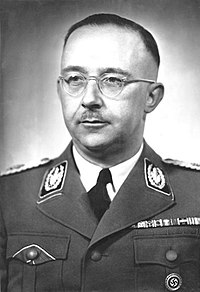Himmler
| Heinrich Himmler | |
|---|---|

Heinrich Himmler in 1938
|
|
| Reichsführer-SS | |
|
In office 6 January 1929 – 29 April 1945 |
|
| Leader | Adolf Hitler |
| Preceded by | Erhard Heiden |
| Succeeded by | Karl Hanke |
| Chief of German Police in the Reich Ministry of the Interior | |
|
In office 17 June 1936 – 29 April 1945 |
|
| Leader | Adolf Hitler |
| Preceded by | Office established |
| Succeeded by | Karl Hanke |
| Reich Commissioner for the Strengthening of German Nationhood | |
|
In office 7 October 1939 – 29 April 1945 |
|
| Leader | Adolf Hitler |
| Preceded by | Office established |
| Succeeded by | Office abolished |
| Director of the Reich Main Security Office (acting) | |
|
In office 4 June 1942 – 30 January 1943 |
|
| Preceded by | Reinhard Heydrich |
| Succeeded by | Ernst Kaltenbrunner |
| Reich Minister of the Interior | |
|
In office 24 August 1943 – 29 April 1945 |
|
| Chancellor | Adolf Hitler |
| Preceded by | Wilhelm Frick |
| Succeeded by | Wilhelm Stuckart |
| Personal details | |
| Born |
Heinrich Luitpold Himmler 7 October 1900 Munich, Kingdom of Bavaria, Germany |
| Died | 23 May 1945 (aged 44) Lüneburg, Lower Saxony, Germany |
| Political party | National Socialist German Workers' Party (NSDAP) |
| Spouse(s) | Margarete Boden (m. 1928) |
| Relations |
|
| Children |
|
| Alma mater | Technische Universität München |
| Profession | Agronomist |
| Cabinet | Hitler Cabinet |
| Religion | Neo pagan |
| Signature | |
| Military service | |
| Allegiance |
|
| Service/branch | Bavarian Army |
| Years of service | 1917–18 |
| Rank | Fahnenjunker |
| Unit | 11th Bavarian Infantry Regiment |
| Battles/wars | World War I |
Heinrich Luitpold Himmler (German: [ˈhaɪnʁɪç ˈluˑɪtˌpɔlt ˈhɪmlɐ]; 7 October 1900 – 23 May 1945) was Reichsführer of the Schutzstaffel (Protection Squadron; SS), and a leading member of the Nazi Party (NSDAP) of Nazi Germany. Nazi leader Adolf Hitler briefly appointed him a military commander and later Commander of the Replacement (Home) Army and General Plenipotentiary for the administration of the entire Third Reich (Generalbevollmächtigter für die Verwaltung). Himmler was one of the most powerful men in Nazi Germany and one of the people most directly responsible for the Holocaust.
As a member of a reserve battalion during World War I, Himmler did not see active service. He studied agronomy in college, and joined the Nazi Party in 1923 and the SS in 1925. In 1929, he was appointed Reichsführer-SS by Hitler. Over the next 16 years, he developed the SS from a mere 290-man battalion into a million-strong paramilitary group, and, following Hitler's orders, set up and controlled the Nazi concentration camps. He was known to have good organisational skills and for selecting highly competent subordinates, such as Reinhard Heydrich in 1931. From 1943 onwards, he was both Chief of German Police and Minister of the Interior, overseeing all internal and external police and security forces, including the Gestapo (Secret State Police). Himmler had a lifelong interest in occultism, interpreting Germanic neopagan and Völkisch beliefs to promote the racial policy of Nazi Germany, and incorporating esoteric symbolism and rituals into the SS.
...
Wikipedia
